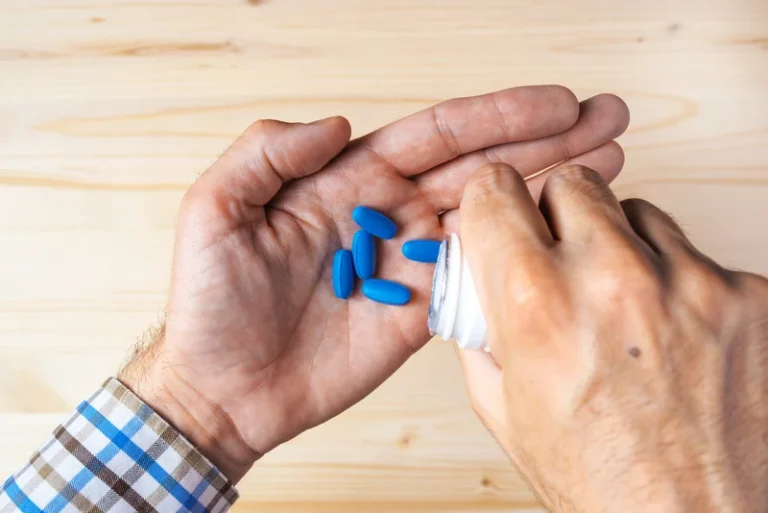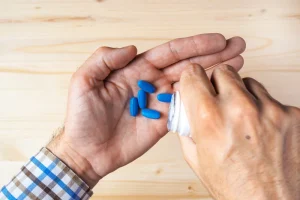A Standardized Kudzu Extract NPI-031 Reduces Alcohol Consumption in Non Treatment-Seeking Male Heavy Drinkers
Increases in 5-HIAL have been shown to be correlated with decreased alcohol consumption in hamsters (Keung et al., 1995). Kudzu’s alteration of alcohol consumption may be through direct effects at brain benzodiazepine receptors on the GABAA complex. Medication adherence was excellent and there were no adverse events, changes in vital signs, blood chemistry, renal or liver function. There was no effect on alcohol craving, but kudzu extract significantly reduced the number of drinks consumed each week by 34–57%, reduced the number of heavy drinking days and significantly increased the percent of days abstinent and the number of consecutive days of abstinence. Separate general linear model ANOVAs for data with repeated measurements were used to analyze the number of drinks per week and the number of heavy drinking days per week. The two treatments (kudzu and placebo) were analyzed as fixed effects and time (weeks since randomization) as a repeated-measurements effect.
Rats
It is important to talk to a healthcare professional before taking kudzu, especially if you have liver disease or are taking prescription medication. Studies have shown that kudzu may work by increasing blood flow to the brain, reducing the desire to drink, and reducing the severity of hangovers. Kudzu, also known as Pueraria Montana, is a climbing vine that belongs to the pea family.

1 Participant Flow Through Study
- Medication adherence was measured using ultraviolet (UV) light to detect riboflavin in centrifuged urine samples (Del Boca et al., 1996) that were collected twice a week.
- Furthermore, there is a need to develop efficacious medicines from natural products that have a low incidence of side effects or toxicity (Xu et al., 2005).
- We employed two different biochemical methods (urinary riboflavin and plasma puerarin levels), to monitor medication adherence.
- The complete lack of side effects would favor the conduct of such studies.
In my opinion, the Planetary Herbals brand is a great option for someone who has not yet quit drinking, and who wants to try pure kudzu powder on its own. Because my drinking levels were so stupendously high in the first place, kudzu https://ecosoberhouse.com/ did not turn me into a moderate drinker by any stretch of the imagination. The room contained a small sink with an under-the-counter refrigerator where the beverages (beer, juice, and water) were kept. While kudzu may help improve symptoms, it also comes with its own set of side effects.
Can kudzu be taken in conjunction with other medications for alcoholism?

Puerarin, one of the most abundant isoflavones in kudzu root extracts, is a known vasodilator and is approved for such use in China following coronary infarction and stroke (Wu et al., 2014). We developed a standardized kudzu extract that preserved the ratio of the major isoflavones found in the raw root, except that the concentration of isoflavones was increased to 25%. Regardless of the mechanism of action, the present finding that a modest, single dose of kudzu extract reduces binge drinking has profound implications as it offers a unique opportunity for kudzu for alcohol cravings early intervention for problem drinkers.

- Because prescription medications are not universally used or have a perceived modest effect (Krystal et al., 2001; Mark et al., 2003), providing heavy drinkers with any type of intervention that yields even a modest reduction in drinking is desirable.
- However, if you want to cut down on drinking or detoxify your body during alcohol withdrawal, this plant may be able to help.
- While kudzu may help improve symptoms, it also comes with its own set of side effects.
- The overall incidence of side effects (e.g., headaches, shakes, chills, nausea, etc.) in both groups ranged between 1.7 and 3%.
If you experience any adverse reactions while using kudzu, consult your healthcare provider promptly. If you have any questions about using kudzu recovery for alcoholism, please leave them in the comment box below. However, there are a lot of supplements that claim to contain it that are mostly cheap fillers.
Kudzu and Diabetes
After providing written informed consent, a psychiatric evaluation (Structured Clinical Interview for DSM-IV disorders (First, 2002)) was performed and a physical exam including electrocardiogram, vital signs, full hematology, blood chemistry and urinalysis tests was conducted. Persons of Asian descent were excluded because of their known increased flushing reaction to alcohol. Individuals with a body mass index (BMI) outside the range of 18–25 kg/m2 were also excluded.
1 Participants

The Daily Diary was made up of a total of 14 questions of which 9 were Likert-type scales to amphetamine addiction treatment assess subjective effects on mood, appetite, anxiety, ability to concentrate, irritability, desire to drink alcohol, amount of sleep, physical tension and physical symptoms in the past 24 hours. Three questions asked them to report how many alcoholic drinks, tobacco cigarettes and caffeinated beverages they consumed and two questions asked about bedtime and wake time. The root of the Kudzu plant has been used for centuries in Chinese medicine to treat a variety of ailments, including alcoholism.
A Standardized Kudzu Extract (NPI- Reduces Alcohol Consumption in Non Treatment-Seeking Male Heavy Drinkers
As an herbal plant extract, kudzu can be made available without a prescription. While it does not completely eliminate drinking, it is clearly effective in significantly reducing intake, which offers individuals an opportunity to engage in more responsible drinking patterns. As a safe, over-the-counter preparation, kudzu may be used alone in initial attempts to curb alcohol consumption, but it may also become a useful adjunct to the currently available prescription medications.
There were no changes in any vital signs, hematology, blood chemistry, renal or liver function tests during the three phases of the study. The maximal possible observations were based on the number of side effect categories that were recorded, multiplied by the number of study days in each phase, which was then multiplied by the number of subjects participating in each study phase. The overall incidence of side effects (e.g., headaches, shakes, chills, nausea, etc.) in both groups ranged between 1.7 and 3%. None of the study participants reported any insomnia, sedation, dizziness, blurred vision, tinnitus, or altered libido. The safety of kudzu extract was monitored via a number of methods including twice weekly assessments of vital signs (resting pulse, blood pressure), collecting daily reports of side effects using a daily diary and twice weekly assessments of adverse events by study staff. An industry standard adverse event reporting form was used to collect information on potential adverse and serious adverse events during each laboratory visit.